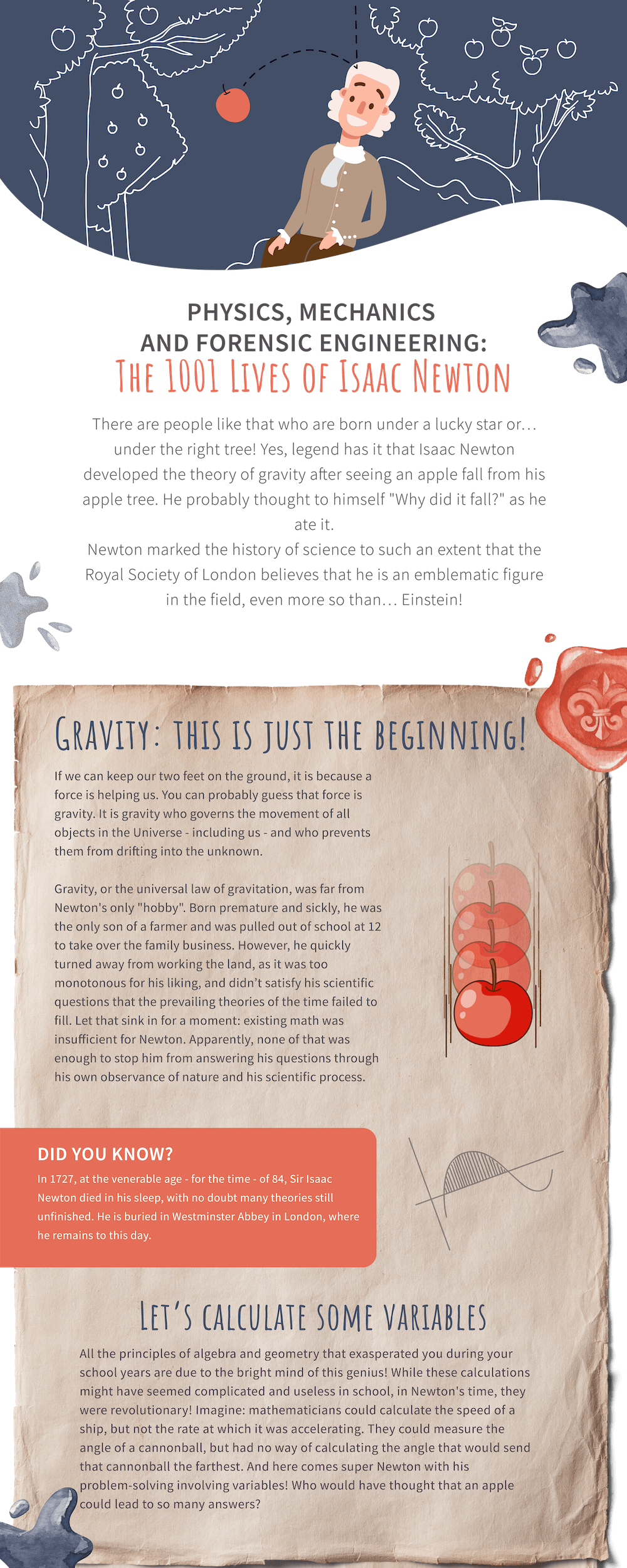

Physics, Mechanics and Forensic Engineering: The 1001 Lives of Isaac Newton
There are people like that who are born under a lucky star or… under the right tree! Yes, legend has it that Isaac Newton developed the theory of gravity after seeing an apple fall from his apple tree. He probably thought to himself “Why did it fall?” as he ate it.
Newton marked the history of science to such an extent that the Royal Society of London believes that he is an emblematic figure in the field, even more so than… Einstein!
Gravity: this is just the beginning!
If we can keep our two feet on the ground, it is because a force is helping us. You can probably guess that force is gravity. It is gravity who governs the movement of all objects in the Universe – including us – and who prevents them from drifting into the unknown.
Gravity, or the universal law of gravitation, was far from Newton’s only “hobby”. Born premature and sickly, he was the only son of a farmer and was pulled out of school at 12 to take over the family business. However, he quickly turned away from working the land, as it was too monotonous for his liking, and didn’t satisfy his scientific questions that the prevailing theories of the time failed to fill. Let that sink in for a moment: existing math was insufficient for Newton. Apparently, none of that was enough to stop him from answering his questions through his own observance of nature and his scientific process.
Let’s calculate some variables
All the principles of algebra and geometry that exasperated you during your school years are due to the bright mind of this genius! While these calculations might have seemed complicated and useless in school, in Newton’s time, they were revolutionary! Imagine: mathematicians could calculate the speed of a ship, but not the rate at which it was accelerating. They could measure the angle of a cannonball, but had no way of calculating the angle that would send that cannonball the farthest. And here comes super Newton with his problem-solving involving variables! Who would have thought that an apple could lead to so many answers?
Mathematical curiosity at the service of forensic engineering
Exceptional in his time, Newton’s calculation tools are now part of the daily life of forensic engineers and other scientists. For example, acceleration and deceleration data is constantly used to understand how crashes occur. As for the gravitational acceleration – known as G (9.8m/s2) – it is used, among other things, to calculate the forces involved in structural collapses, as well as in any other problems concerning safety, collapses, ballistics, ruptures or any other industrial failure.
We should also mention his differential calculus, quite simply essential to the practices of physicists, economists and other mathematicians. His equations allowed engineers involved in the Apollo program to chart a course from the Earth to the Moon in the 1960s. Although this feat cannot rest on Newton’s shoulders alone – the German mathematician Gottfried Leibniz having developed calculus around the same time – Newton remains a powerful example of his legacy.
A life dedicated to science…among other things!
Alternately mathematician, physicist, philosopher, alchemist, astronomer and theologian: Isaac Newton couldn’t satisfy his insatiable need for knowledge and above all, for answers, with only one science. We know that in addition to the universal law of gravitation, differential calculus, the telescope, the theory of color – to name only a few of his discoveries – he developed the modern coin and… the pet door!
The busy and creative life of Sir Isaac Newton came to an end one night in 1727, at the age of 84. He who preferred the company of animals to that of people, nevertheless enjoys eternal recognition from the scientific community. And like Newton and the apple, our engineers assess the circumstances and let science determine their theories.
FUN FACTS
- In 1727, at the venerable age – for the time – of 84, Sir Isaac Newton died in his sleep, with no doubt many theories still unfinished. He is buried in Westminster Abbey in London, where he remains to this day.
- The only son of a farmer, baby Newton is born prematurely. Due to his frail constitution, he wasn’t expected to thrive. However, he defies all predictions, as history has shown!
- Newton’s future plans and the plans his mother had for him were very different! She took him out of school at the age of 12 in the hope that he would take over the family farm, but Newton showed little interest in working the land, finding it too monotonous.
- Between pondering the Universe and infinitesimal calculus, how did Newton spend his free time? He was solving other equally crucial problems, like… stopping his cat from scratching at the door! Yes: Newton invented the pet door!
